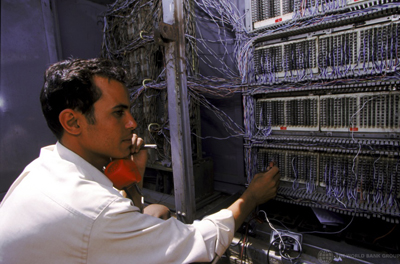Bringing Electricity to Rural Communities in Yemen

Summary
Yemen successfully provides electricity to urban areas, but many rural areas remain underserved. Although the Government of Yemen (GOY) had outlined a rural electrification plan, it lacked clarity on how to create, operate, and supervise the new nationwide Rural Electric Service Provider (RESP) . The GOY also lacked experience starting and managing rural electric cooperatives and implementing a rural-grid tariff system. In response, the World Bank’s South-South Facility agreed to fund a knowledge exchange to help Yemen’s Ministry of Electricity and Energy (MOEE) implement its Rural Energy Access Project. The World Bank arranged for Board Members from Yemen’s General Authority for Rural Electrification (GARE) to visit officials of the Rural Electrification Board (REB) in Bangladesh to learn from their experiences establishing rural electric societies and expanding rural access to electricity.
GARE’s leaders gained insight on how to start and manage rural electrical cooperatives. They broadened their perspective on the financial challenges of sustaining these organizations; the exchange also increased the Yemeni leaders’ confidence that similar initiatives could be adapted for Yemen’s political and social circumstances.
“Some of the rural electrification approaches used by Bangladesh would not be as appropriate for Yemen because of the tribal nature of political organization, and other factors, in rural Yemen,” said Jianping Zhao, Senior Energy and Mining Specialist in the World Bank’s Energy and Transport Sector Unit. “[Nonetheless], Yemen gained firsthand knowledge about developing country experiences in promoting sustainable rural electrification through an innovative approach which was fresh and new to the Yemenis,” said Zhao.
Beneficiaries / Participants
Although the Government of Yemen (GOY) had taken steps to outline a rural electrification plan, it lacked experience implementing nationwide rural electrification programs and reforms. The GOY was unsure how to create and supervise its new nationwide Rural Electric Service Provider, the General Authority for Rural Electrification (GARE) of Yemen. The government also had little experience in other important areas, such as starting and managing rural electric cooperatives, ensuring transparent governance of these cooperatives, or implementing a grid-based, financially sustainable tariff system for rural areas.
To implement Yemen’s Ministry of Electricity and Energy’s (MOEE) Rural Energy Access Project, the GOY wanted to gain insight on these issues from another country that had implemented similar programs. The World Bank’s South-South Facility agreed to fund an exchange to address the GOY’s knowledge gaps. The Washington, DC-based National Rural Electrical Cooperative Association (NRECA), appointed by the Bank as a consultant, arranged for GARE Board Members to visit officials of the Rural Electrification Board (REB) in Bangladesh, which had established rural electric societies and expanded rural access to electricity. The Yemeni officials especially wanted to learn how to manage start-up challenges and how Bangladesh had scaled up its national Solar Home System program.
Moving forward
Political turmoil in Yemen notwithstanding, this knowledge exchange is part of a phased approach to support the Government of Yemen’s (GOY) efforts to find sustainable rural development solutions, including sustainable development of Yemen's rural electrification and renewable energy development program. The exchange will help the GOY foster rural electricity reforms and establish independent Rural Electric Service Providers to increase rural citizens’ access to electricity, thereby promoting economic growth and decreasing poverty.
The government aims to provide electricity attached to the national grid in twelve service territories in twelve governorates. It also aims to bring electricity to some isolated communities in areas that cannot connect to the national grid cost-effectively. The GOY seeks to increase access to electricity from the current level of 20 percent of rural households to about 30 percent through grid extensions and Solar Home Systems.

 China
China Colombia
Colombia Denmark
Denmark India
India Indonesia
Indonesia Mexico
Mexico Russian Federation
Russian Federation Spain
Spain United Kingdom
United Kingdom